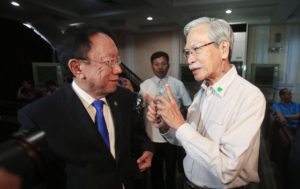THE SUPREME Court on Wednesday extended to October 18 the status quo order halting the planned burial of the late former President Ferdinand Marcos at the Libingan ng mga Bayani, giving the magistrates more time to study the case.
This means there will be no interment at the Heroes’ Cemetery in Taguig this month as planned by the late strongman’s family with the permission of President Rodrigo Duterte, who promised to allow the burial during the election campaign to put an end to a lingering issue.
The court en banc first issued a 20-day status quo ante order on August 23, at the request of petitioners seeking to block the burial, mostly victims of Martial Law.
On Wednesday, the parties were ordered to submit their respective memoranda to the court within 20 days, following a second round of oral arguments.
Government lawyers told the high tribunal Marcos’ achievements as a soldier who fought against the Japanese during World War 2 would not be diminished just because he was ousted by the EDSA “People Power” revolt in 1986.
Solicitor General Jose Calida was asked by Associate Justice Teresita Leonardo de Castro if the removal of Marcos from the presidency could be considered as a basis for stripping him of honors, such as the Medal of Valor, as a war hero.
“It is in the position of the State that once it (Medal of Valor) is awarded, it cannot be diminished. It cannot be nullified,” Calida said during the oral arguments.
“Based on military standards, given to a Medal of Valor awardee, former President Marcos fits to the definition of a hero,” Calida added.
Imelda’s pension
Marcos was awarded the Medal of Valor, the highest Philippine military accolade, in October 1958 for fighting the Japanese forces in Bataan in January 1942.
Proof of gratitude of the Philippine government, said Calida, is the pension given by the State to Marcos’ widow, former first lady and Ilocos Norte Rep. Imelda Marcos.
Mrs. Marcos has been receiving a P25,000 monthly pension—P20,000 for the former President’s Medal of Valor and P5,000 for his military service—since 1994.
This was not disputed by the National Historical Commission of the Philippines (NHCP).
NHCP Chairwoman Ma. Serena Diokno said her agency only probed the war medals that Marcos allegedly claimed to have received from the United States Army.
For the Commission on Human Rights headed by Jose Luis Martin Gascon, Marcos should be denied a place at the Libingan ng mga Bayani because of rights abuses committed during Martial Law.
“It is our opinion that burying him at the Libingan ng mga Bayani would be contrary to international and national laws with respect to human rights,” said Gascon.
Victims’ pain
Chief Justice Maria Lourdes Sereno asked government lawyers if allowing the burial would only bring pain to the victims of Martial Law, pointing out that there was no confession or acknowledgement of the abuses during the Marcos regime.
“Aren’t we disacknowledging the pain of the victims by the burial?” Sereno asked.
Calida said mere burial won’t erase the history, and that “hope springs eternal” as regards the healing of human rights victims.
The Marcos family’s lawyer, Hyacinth Rafael-Antonio, said the emotions of the victims have no relevance to the case, as the burial is allowed by military regulations.


